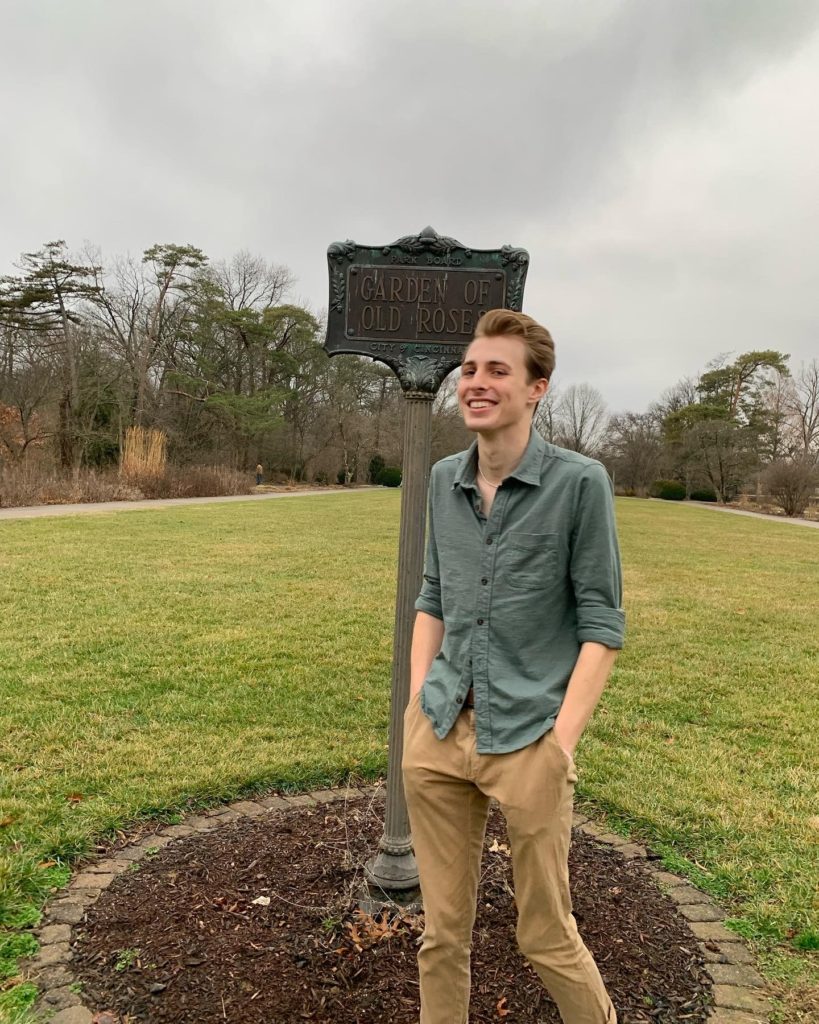
Tyler‘s poem “Space Boots” was featured in our Fall 2022 edition of Short Vine. Read to learn more about Tyler’s writing process for this poem. Haven’t read “Space Boots” yet? Head over to our Instagram reel to listen to Tyler read the poem!
1. Short Vine’s Fall 2022 edition focused on dreams, nightmares, and bouts of deja vu. Writers were asked to explore their contemporary reality. How did you interpret the theme, and how did that interpretation impact your writing process?
When I dream, I often find myself waking up and wondering if it was real. This poem describes a situation and feeling that’s very real and isn’t something you can wake up from and be relieved that it was all in your head. I tried to take this story I had, of a child reflecting on their absent father, and make it feel very dreamlike. Almost like the narrator is coping with their sadness by making it into something heartbreakingly nebulous. You can wake up from a dream and feel it slip slowly from your mind, and here the narrator reflects on what they remember of their relationship with their father by meshing reality with dreamy details. It’s a poem that gives you a small glimpse into a very vast story, like how you remember portions of a dream. It’s one piece of a much larger puzzle, one scene from a very long dream.
2. Describe your poem in three words.
Reflective, brooding, and forlorn.
3. You use alliteration quite a few times in this piece, and we feel that it works very well. Do you often find yourself utilizing alliteration? Are there other poetic devices you find yourself drawn to?
I often cling to alliteration in my writing because of how it keeps the attention on my words, and I tend to be very particular about my diction. Alliteration allows me to emphasize that my words are chosen purposefully. It also allows for some rhythm in poetry, and that can be an important factor in successfully crafting a free-verse poem. This poem is filled with many metaphors too, which helped me bring a dreamy and hazy atmosphere to the piece.
4. You use the idea of space (often utilizing astronomical concepts) to evoke a desolate and melancholy tone. Why did you choose to use the metaphor of space to convey the concept of leaving?
In this piece, I envisioned a child’s relationship with an unreliable and absent father. The child doesn’t know where the father goes, just that he always leaves, and he’s always far away. The child envisions him in outer space as a way to create the answers they don’t have. There’s a lot that’s unknown about space, and we don’t know everything that is out there, but we do know that it is filled with mystery in its magnitude. The narrator doesn’t know where the father goes, but they are consistently so emotionally and physically distant from each other that they might as well be galaxies apart. Space has a mystique to us because of its vastness and its secrets, similar to how the father in this poem holds many unanswered questions for the narrator.
5. You repeat the line “Welcome home pumpkin,” twice in your poem. Why did you choose to repeat this particular line?
I think that there are many people who love to make broken promises, and then shower you with love and sweetness to make you forget that they’re untrustworthy. They’ll promise over and over again that they’ll stay this time, that they won’t break your heart, that they’re different now. The father in this piece is one of those people. A valuable lesson to learn in life is that these kinds of people typically won’t change, and that they truly don’t even want to change. The narrator in this poem recounts very isolating, desperate moments, and is in a kind of emotional exile as they reflect on their damaged paternal bond. By repeating, “Welcome home, pumpkin,” twice, it infuses the point that this is a very repetitive and predictable relationship. The narrator watches the father come and go, and the father never changes.
6. Do you have a favorite line in this piece? If so, why is this line your favorite?
The line, “lodged in your clear cellophane, foolishly feeling safe,” is one that I would choose as a favorite because of how honest it is. Sometimes it’s easier to live in a state of delusion than it is to face the obvious because the obvious isn’t always what you want to believe. The narrator wanted to believe that their father would stay, but in the end he left them again, and deep down, they knew he would all along. As children, we want to be able to trust who we love, especially our parents, and we hope that they’ll stay and reciprocate our unconditional affection, and so there are times when children put full faith in parents who don’t deserve it. You can piece a broken heart together over and over again, each time losing more of yourself, but how many times can you entrust it to someone who only intends to drop it again? In this line, we see the narrator reflect on their mistake. They see their father for the unreliable person he is, but they choose to give him endless chances at their own expense.
7. Where do you find the most inspiration for your work? Are there any particular poets you feel particularly drawn to?
I get much of my inspiration from my personal life. Not all of what I write is entirely autobiographical, but all of it at least deviates from my life, my feelings, and my perception of reality. I find myself naturally exploring the many complex facets of love in my poetry because it is a feeling I am so entranced by. Love has a heavy affect on people, including myself. There’s a large emphasis on feelings and emotions in my poetry, and I’m inspired by writers who can portray their emotions so clearly. The kinds of writers who can describe their feelings, something so intangible, and make you imagine it so clearly are the ones who inspire me the most. Poets like Sylvia Plath, Ocean Vuong, and Emily Dickinson fit this description, but I also gravitate to lyricists like Taylor Swift and Lana Del Rey, both of which have also published poetry. It’s also common for me to scavenge miscellaneous literary journals because there are many hidden gems inside of them. My inspiration for writing is very eclectic, but one thing that inspires me the most is to explore the many angles of love and emotions.
8. How do you overcome roadblocks you run into when writing? How do you deal with rejection?
There are many different ways of dealing with roadblocks in writing. Sometimes I’ll write a poem or a line and be unsure of what to do with it, and then will bury it in my “Poetry Morgue.” This is just a file I have on my computer that I occasionally visit to bring old ideas back from the dead, and I’ll visit them when I feel stuck or unsure of what to write about. Another roadblock I often face in writing is having self-doubt about myself or my writing. When I feel this way, I often take a break, ask others for their honest advice and opinions, and this usually alleviates the feeling. It’s important to remember to write for yourself, not for others, and this way, rejection won’t hurt as much. My poetry is a cathartic, therapeutic outlet for me. If my poem is rejected, I can accept that because it was a creative outlet for me, and maybe sometimes that’s all it’s meant to be. Don’t allow rejection to void your poetry of purpose. Allow yourself to create new pathways around roadblocks, and to find meaning in your work.
9. Do you have any advice for writers considering submitting their pieces?
My advice is to read the guidelines of the journal you’re applying to because that will determine whether or not your poetry is a good fit. If you apply to a journal blindly, you take the risk of missing out on an opportunity to be published because you ignored their expectations. I think it’s good to take these themes provided by journals and to try and create something unique out of them. Challenge yourself to offer up something that no one else can.
